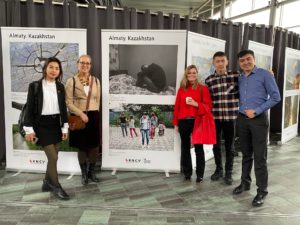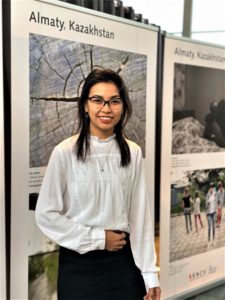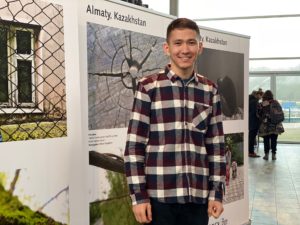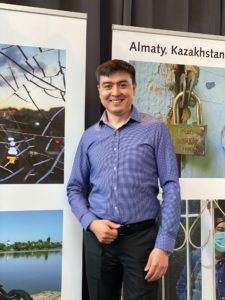
Stigma and discrimination are recognized as some of the most commonly identified barriers to fight the tuberculosis (TB) epidemic. Reducing TB stigma is essential because it hinders care seeking, contact tracing, outbreak investigations, treatment initiation, adherence and quality of care. Moreover, it deprives people with TB of their rights and the respect of others.
In collaboration with partners on global, regional and national levels, KNCV Tuberculosis Foundation has developed two stigma reduction packages within TB Photovoice project and piloted them in communities and health care facilities providing TB and TB/HIV in Kazakhstan, the Philippines and Nigeria, funded by the Dutch Ministry of Foreign Affairs.
In Kazakhstan the initiative was implemented by AFEW-Kazakhstan, Sanat Alemi, and Doverie Plus.
For reference
Kazakhstan is one of the 20 high-burden countries for multidrug-resistant TB (MDR-TB). The country has made great progress towards eliminating TB in recent years, with diagnosis, successful treatment and notification rates exceeding the WHO recommenrdations and the estimated incidence.
In may 2018, 12 professional participated in a “Training of trainers” course to learn how to implement TB Photovoices, 9 of whom facilitated the intervention with patients in the end. The group included 6 psychologists, a social worker and a doctor
The TB Photovoice intervention was implemented with 9 (ex-) TB patients – with a mixture of drug-susceptible and drug-resistant TB – some of whom were still on treatment at the time.
The final products (photos, quotes and stories) were launched and shared with the broader Almaty community in advocacy exhibitions and were also reproduced into banners, desc calendars, bads, T-shirts, and postcards to use in heath facilities when counselling new TB patients.
 Symbat Sapargalieva, social worker of Sanat Alemi NGO, participant of the PhotoVoices Project
Symbat Sapargalieva, social worker of Sanat Alemi NGO, participant of the PhotoVoices Project
When I found out that I had tuberculosis, I felt so ashamed. There were many negative thoughts in my head. I denied my disease and was pulling away from my family and friends.
I was happy to take part in the PhotoVoices Project and then realized that I have a self-stigma. This project helped me to understand that my friends did not turn their backs on me, it was me who isolated myself from them. There was an exercise called Lifeline with TB, when I had to write down all my negative and positive thoughts. I wrote down only negative ones as I could not find any positive sides of the disease. However, two weeks after I was able to find something good about TB.
I mean, when you realize your problem deep inside and bring it out, it is such a relief. After a while, I set some goals for myself and got a job with a civil society organization to help people who were the same as me. Half of my dreams have already come true!
The main thing I realized is that if you want to change people’s opinion, change yourself. The PhotoVoices Project gave me my voice and a chance to be heard.
 Sholpanata Kaldarov, student of the International IT University, participant of the PhotoVoices Project and the Self-Stigma Project, volunteer of Sanat Alemi NGO
Sholpanata Kaldarov, student of the International IT University, participant of the PhotoVoices Project and the Self-Stigma Project, volunteer of Sanat Alemi NGO
When I was invited to take part in the PhotoVoices Project, I was still receiving my TB therapy. I said yes right away as I thought that photos could somehow provide psychological support and motivation to people who just learned that they had TB and also myself, of course.
When I was found to have TB, doctors checked everyone I had contacts with. I felt worse not even because of my own diagnosis, but because all people who were in contact with me had to be checked. Back then, I lived in a student dormitory, and even though my form of TB excluded the transmission of infection, doctors still checked about 100 students from the dormitory and 20 of my group mates. Afterwards, these people had to come to the clinic for special medical check-ups every six months. I felt guilty, so I gradually pulled away from my friends. I had self-stigma.
In the PhotoVoices Project, I experienced a lot of emotions. Before the photo is taken, you remember your past and drag the disease through yourself again. In the beginning, it was difficult to focus on details, but then I felt better and learned to openly talk about my disease.
In our group, there were patients, who already completed their treatment. Talking to them, I heard how they were able to overcome the disease. Gradually, I felt confident that I would also be able to finish my treatment successfully.
I want to thank this project, it really helps the patients who isolated themselves after the disease and lost their self-esteem.
 Amanzhan Abubakirov, Teaching Assistant at the Phthisiopulmonology Department of the Kazakh National Medical University named after S.D. Asfendiyarov
Amanzhan Abubakirov, Teaching Assistant at the Phthisiopulmonology Department of the Kazakh National Medical University named after S.D. Asfendiyarov
Once, the head of our department invited me to take part in a project on stigma. I heard the term “stigma” before, but to be honest did not really know how it can be manifested and how it affects people. It was something new for me, so I agreed to participate.
In the course of the project, I realized that for a long time I was stigmatizing both myself and my patients. Sure, I was kind to them and treated them well, but I thought that I was a doctor and that I was better than them. I have to admit that I feel so ashamed for it.
During the project, we took part in such exercises as “Our Imperfection – Their Imperfection”, “Cross the Line” and so on. Thanks to such exercises, we were able to feel what patients feel, we were able to be in their shoes.
This project really changed my perspective, my view of the world. As a result, I built friendly relations with the patients who stay in our hospital for a long time. I stopped using any terms, which can stigmatize the patients.
More often, I talk to the patients’ relatives, tell them about stigma and ask them to provide more support to the patients.
Besides, I talk to the medical staff working at our department. As I also work at the Medical University, I devote special hours during my classes to talk about stigma and discrimination to my students.
I want to deliver the message that all people are equal, no one is better or worse. However, people with TB are real heroes. Every day, they take a lot of medicines with numerous side effects. Their spouses leave them, their friends turn their back on them, but they continue their fight.
Thank you everyone who fights TB!



